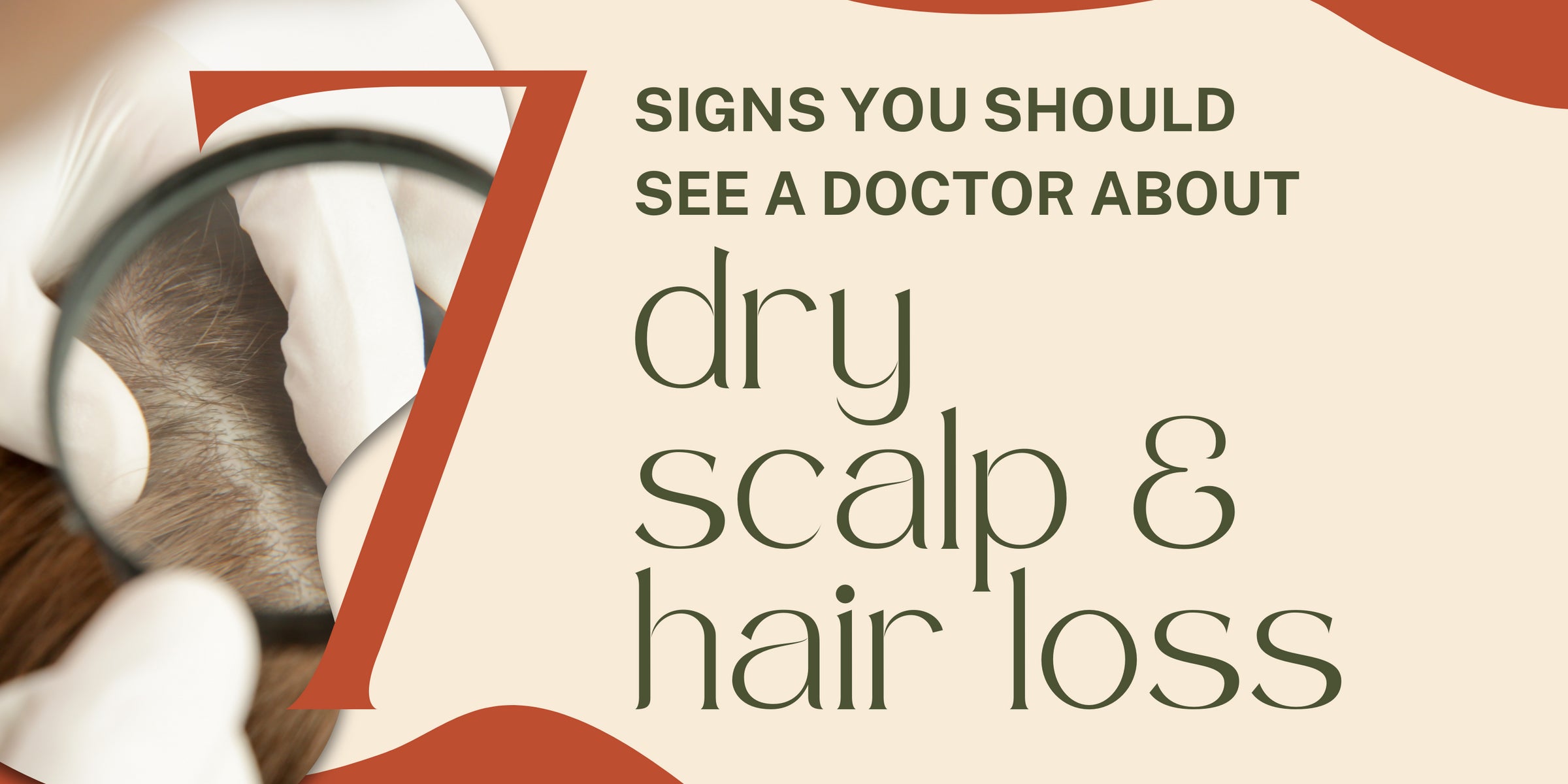
Dry scalp is a common complaint, and many cases can be easily treated with proper scalp care, natural remedies, and over-the-counter medications.
But, sometimes a dry scalp is a symptom of a more serious problem that needs to be treated by a doctor before it leads to permanent hair loss.
Here are 7 scenarios in which you should definitely book an appointment with a doctor, preferably a dermatologist- a doctor who specializes in conditions of the skin, hair, and nails.
#1: You Have Excessive Itching
Itchy scalps are common, but not to be ignored. The truth is, your scalp should be comfortable! So whenever your scalp is persistently itchy, it’s time to start paying attention.
“Your scalp should not be itching you extensively,” says Vigor Roots Founder Nathalee DuRose. “It’s OK to have a random itch, but if you realize that within a day you’re scratching your head 10 times or itching for minutes at a time- you should see a doctor.”
Persistently itchy scalps can be a symptom of a variety of conditions that require treatment like dandruff, ringworm, or lichen planus.
Further, scratching can irritate and tear the sensitive skin of the scalp- which can lead to infection.
So, if you’ve got an itchy scalp- step one is to make sure you have a healthy scalp care routine that includes:
- Regular washing & moisturizing
- Gentle hair care products & tools
- Styling that doesn’t place excessive tension on the scalp, use harsh chemicals, or heat styling tools
If the itch persists despite a gentle scalp care routine, it’s time to get it checked out by a doctor.
#2: Stubborn Rashes, Bumps, Flaking, or Scarring
Healthy scalps feel smooth, moisturized, and comfortable. Flaking, pimples, bumps, and rashes are all signs of an unhappy scalp.
That’s why regularly running your fingers over your scalp to check for any changes in the texture is an important part of scalp health. DuRose recommends doing at least a monthly self scalp examination so that you can catch on to any potential issues early enough to treat them.
“When I hear people discussing their scalp conditions, it is sometimes apparent that they have spent months, probably years, missing subtle signs, symptoms, and preventable causes,” she says. “These could have been resolved with a slight change in routine, or the application of a scalp serum to treat an infection unintentionally left untreated.”
Should you come across a bump or rough patch, DuRose recommends looking at it with a mirror or using your phone to photograph it. Make sure the area is washed and moisturized with gentle products that don’t contain irritants. Bonus points if they include natural ingredients with antimicrobial, antifungal, and antibacterial properties such as Root22Serum. Then monitor the area to see if it clears up.
If proper cleansing and moisturizing doesn’t take care of the issue within a month, DuRose says it’s time to see a doctor.
#3: Your Stylist Says To
If your stylist has concerns about your scalp, take it seriously. They can see more of it than you can, plus they have the training and experience to notice when something is amiss.
It’s especially important to get your scalp taken care of if you’re planning on bleaching, dying, relaxing, or perming your hair or if you’re going to have a tension style put in. These hairstyles are likely to strain even a healthy scalp, so if your stylist has concerns, pump the breaks. When your scalp is in poor condition, moving forward with this sort of styling is a recipe for hair loss.
Moral of the story: follow your stylist's advice for scalp care- whether it’s a deep moisturizing treatment or an appointment with a dermatologist.
#4: You’ve Tried a Treatment for 6 Months & It Hasn’t Worked
Perhaps you’ve followed your stylist’s recommendations and/or have been trying all the natural remedies and all the over-the-counter treatments- but your scalp is still uncomfortable and your hair hasn’t returned to full thickness.
DuRose says that if you’ve fully committed to scalp care for 6 months and still haven’t seen an improvement, it’s time to talk to a doctor.
#5: You’re Considering a Hair Transplant
Before you spend thousands on a hair transplant surgery that your insurance won’t cover, head to the dermatologist to see if less drastic and expensive treatments can get you the results you want.
Not everyone is a suitable candidate for a hair transplant surgery, and hair transplant surgeries are not guaranteed to work.
Improper hair transplants can actually wind up damaging hair follicles that could have been healed enough for new hair growth with the help of a dermatologist and proper scalp care. Several disappointed hair transplant patients are DMing DuRose for scalp advice as we speak, dismayed that the procedure didn’t result in restored, healthy hair.
It’s true that proper scalp care will not be a quick fix for hair thinning- DuRose says to give it 6-12 months to fully take effect. But, proper scalp care is much gentler and less expensive than heading right for the hair transplant surgeon.
Think of it, instead of running up a $4,000+ surgery bill, your dermatologist may just suggest you change up your diet and avoid certain ingredients in your hair care products.
If you do decide to move forward with a hair transplant, no judgment. But do make sure to check with your dermatologist first about whether or not you’re a good candidate. Then do your research and only use a specialized hair transplant surgeon with a track record of getting people good results.
#6: You Have Hair Loss and an Autoimmune Disease
Certain autoimmune diseases like lupus, Hashimoto’s disease, psoriasis, and more can result in hair loss.
If you have an autoimmune disease and are experiencing an uncomfortable scalp and/or hair thinning, it’s important to discuss remedies with a dermatologist- as the most effective treatments are likely specific to your condition rather than something you can easily find with a Google search.
In some cases, folks with autoimmune diseases are not able to regrow healthy hair- but they can certainly still care for their scalp and rock bald is beautiful or hairless & handsome.
#7: You’re Taking a Medication That Counters Hair Growth
Hair loss can be a side effect for many common types of medications from birth control, to thyroid medications, to antibiotics, and mood stabilizers.
Check if your medications have hair loss as a possible side effect. If so, talk to your doctor about how to address it.
It’s Not Too Late for Scalp Health
If you’re having trouble with your scalp and hair loss, please know you’re not alone.
“There is so much shame- so much pressure to look and feel good about your hair. Once people do not measure up to that standard, they are depressed and disengaged from social lifestyles, “ DuRose explains.
Regardless of your ability to grow hair, you deserve a healthy, comfortable scalp and peace of mind. Rather than suffer in silence and shame, book an appointment with a dermatologist to treat your scalp.
It also helps to find a supportive community of others going through similar issues. Not sure where to find that community? Follow us on Instagram, and remember our DMs are always open for your scalp and hair questions.
Want to infuse your scalp care routine with extra love and extra health? You’re going to want to get your hands on some Root22Serum.

